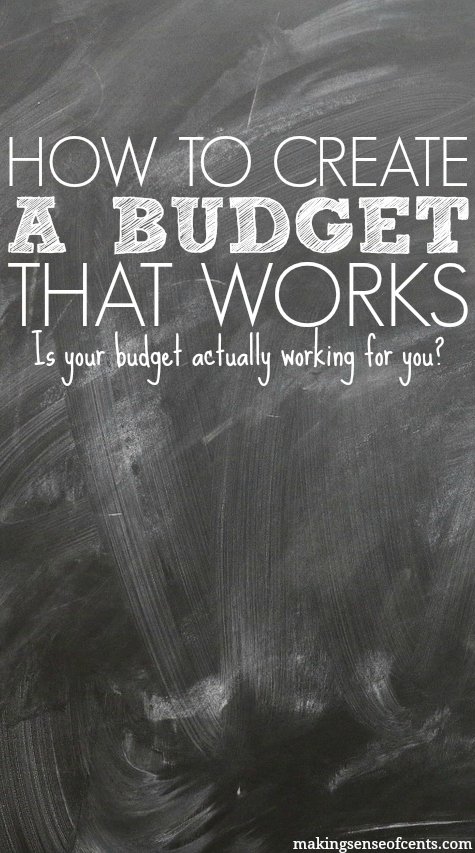Are you interested in creating a budget?
 The average family carries a lot of financial stress. Most people have student loans, credit card debt, a mortgage, car loans, and sometimes even other forms of debt.
The average family carries a lot of financial stress. Most people have student loans, credit card debt, a mortgage, car loans, and sometimes even other forms of debt.
However, not many people have a budget.
According to a survey done by Gallup, 68% of households in the U.S. do not prepare a budget.
I believe budgets are extremely important and nearly everyone should have one. Rich, poor, middle-class, whatever you are, a budget will likely help improve your financial situation.
Some people think budgets are only for people living paycheck to paycheck, or those with no money.
WRONG!
Budgets are for everyone.
Yes, that means no matter how much money you make, you should probably have a budget. I recently read something that said couples who make $50,000 a month, on average, only save 4% of their income. FOUR PERCENT on a $50,000 monthly income? The majority of that monthly income went towards clothing, food, cars, and homes. I can’t even imagine how someone could blow through so much money each month.
This just proves my point, more people need a budget.
Budgeting may not be the most fun thing in the world, but it needs to be done. Budgeting can help you take control of your financial life, which can help reduce stress and let you reach your dreams.
Other budgeting-related articles you need to read:
- A Cash Budget May Be The Diet You Need
- How I Manage My Finances So I Can Save Time and Worry Less
- The Ultimate Emergency Fund Guide
- Why You Should Pay Yourself First
- How To Save Money – My Best Money Saving Tips
- 14 Best Books About Budgeting
Below are my tips on how to make a budget and creating a budget.
The positives of creating a budget.
Budgets help people manage their money better. It’s that simple.
Budgets are great, because they keep you mindful of your income and expenses. With a monthly budget, you will know exactly how much you can spend in a category each month, how much you have to work with, what spending areas need to be evaluated, among other things.
Budgets have helped people reach their goals, pay off debt, make more money, retire, and more.
Should a budget be electronic or on a piece of paper?
Everyone has a preference, so this depends on what will work best for you.
Pencil and paper can be great, but an electronic version (such as a spreadsheet, Mint, or Personal Capital) can help you easily make changes.
I suggest choosing whatever you are most comfortable with. It doesn’t matter how you keep your budget; it’s just important that you stick to it.
Side note: I recommend you check out Personal Capital. Personal Capital is similar to Mint.com, but much better. Personal Capital allows you to aggregate your financial accounts to easily see your financial situation. You can connect accounts; such as, your mortgage, bank accounts, credit card accounts, investment accounts, retirement accounts, and more. And it’s FREE.
You MUST track your income and spending.
What you want is to create a realistic budget. To show you where your money is coming from and where it is going, you need to gather all of your receipts, bank and credit card transactions, and so on.
Or, you could even take it a step further by tracking everything for the next month or two, this way you know you’re not missing any expenses. This means recording every single transaction with a note that tells you exactly what you bought (if a receipt is not itemized). Then, at the end of the month, you can evaluate your spending.
After one month of closely tracking your spending, I’m sure you’ll be shocked by your results. This is the best way to create a realistic budget, as you will truly see where your money is going, and this will help show you how much should be dedicated towards each category in your budget.
Plus, the shock from seeing exactly where your money is going will encourage you to be wiser with your spending.
Budget category: Income.
For the income part of your budget, it can be from varying sources. You can include income from your day job, rental properties, side jobs, passive income sources, and so on.
One common mistake is that many don’t realize their income can drastically fluctuate from month to month, even when you work the same hours every month or if you are paid salary. Due to this, you will want to be mindful of whether you are paid twice a month, every two weeks, once a week, etc. The difference of when you are paid can change the amount you make each month. Budgeting with a fluctuating income can be difficult, and in a future blog post I will go over it in more detail.
Also, I don’t think bonuses should be included in a person’s budget. Including them in your budget is not usually the best thing to do unless you are 100% certain you are receiving the bonus. I have heard of far too many people who have counted on bonuses only to be let down when it was less than anticipated. Your budget should be realistic, not a fairytale.
Related:
- 75+ Ways To Make Extra Money
- 10 Things I’ve Done To Make Extra Money
- Ways To Make An Extra $1,000 A Month
- The Ultimate Guide To Extra Income
Budget category: Expenses.
Have you ever truly totaled your expenses?
When making a budget, many people only estimate their expenses. However, you actually should be taking your realistic expenses and putting them in your budget as your estimations may be way off.
Here are expenses you may include when creating a budget:
- Home – House payment, rent, maintenance, utilities, insurance, property taxes, etc.
- Car – This includes all car expenses such as your monthly car payment, gas, maintenance, insurance, license plate fees, and so on.
- Television, cable, Netflix, Hulu, etc.
- Cell phone.
- Internet.
- Food – This includes all groceries, eating out, snacks, etc. Seriously, sit down one day and add up your food expenses for the month before.
- Clothing.
- Entertainment – Entertainment can include many things, such as going to the movies, going out for drinks, concert tickets, sports, and so on.
- Charity – If you regularly donate to charity, then this should be an area you budget for.
- Savings funds – This can be for your retirement fund, wedding, travel, etc.
- Taxes – If you are self-employed, then taxes will make up a large part of your budget.
- Health insurance.
- Miscellaneous – Pet expenses, fees, childcare, school, gifts, etc.
Related posts on creating a budget:
Keep your loved ones involved when creating a budget.
Even if only one person manages the family’s finances, the other person in the relationship should, at least, have somewhat of a clue. Conducting regular family money meetings is crucial to having a successful budget and meeting financial goals.
A budget doesn’t work if the other person doesn’t even know it exists!
Make changes when/if needed when creating a budget.
I recommend going over your budget on a regular basis. This may mean once a week, once a month, or something else. Do what feels right for you and what you think your situation calls for.
Many things can change in your budget. Your income may change, your expenses may change, or your goals may change. When something changes, you should adjust your budget to reflect that.
You may have noticed a recurring theme in this budget post, that you should be realistic about everything. Be realistic about what you make, what you spend, and if things need to be changed.
Do you believe in the power of creating a budget? Why or why not?


Leave a Reply
I lived a long time without a budget. It was not because I did not think budgeting was I did not want to save, but because I was unaware of how wasteful I was.
I was probably like most people. I was young and I thought the money would never run out. If you are heading down this path, let me be the first to tell you budget now for your future is the best advice for anyone.
Yes!
Making a budget and tracking your income and expenses is SUCH an eye-opening experience. Once you start to see what percentage of your hard-earned money goes toward random stuff and not toward your financial goals, you realize how a few changes — even minor ones — can get you closer to your financial dreams. Thanks for sharing these ideas!
Yes, I agree!
Totally agree with the power of a budget. There are times where I haven’t done one and all I feel is guilt and being unorganized, it’s like planning a trip without the directions to get there. You’ll drive around aimlessly, wasting time and money. Same thing without a budget, you’ll spend more and have no control
Yes!
Ugh. My problem is not making the budget but keeping track of spending. I loved our Mint and phone apps in the States since I could just buy everything with my card and my spending was automatically tracked. Now that I’m in China, we’re confronted with a society with one foot in cash, one foot in digital transactions. If I wanted I could haphazardly send random people money through a messaging app called WeChat, but that wouldn’t help me buy food. I need cash for that. And keeping track of spending and receipts… I’m kind of a lazy girl.
This post reminded me that I need to go back to the envelope system so we can reign in our spending. PS – I’m also totally shocked that a household with $50,000 per month only saves 4%. Crazy!
Keeping a budget takes work, but online tools make it much easier. If you have a large, annual expense, like property tax, you can budget for it each month instead of scrambling to come up with the funds just before it’s due. Same for preparing for a future expense, like a down payment on a house or retirement. Treat it like an expense and pay toward it each month. Then the money will be there when you need it.
Now I gotta just find a similar way to budget my time …
This is great! I recently starting doing a budget sheet on Excel that my boss taught me and I love how everything is laid out in front of you, but you really have to be strict and consistent when doing so. It is really easy to forget to input something.
Hi Michelle, thanks for this article! Can you share your thoughts on Personal Capital and why you think it is better? I just started using Mint which seems fine so far but I’d be open to changing.
Hello!
I have a review that will explain – https://fund-rise.live/2015/04/personal-capital-review-free-personal-finance-software.html%3C/a%3E%3C/p%3E
Thanks, very helpful.
As far as bonuses go, I don’t include them in my regular budget. If I am expecting money, I keep an “irregular income” list. This has the different areas on it that “extra money” will be spent on. Whether it’s paying down debt or travel or savings. That way, when something like a bonus, or a tax refund comes in, I know right where the money is going.
YES Budget are important, I understood when I was repaying a small debt and changed work, at the beginning was hard to have a good budget, but after some adjustments is been good see monthly difference into my bank balances… BUDGET are absolutely necessary when you have financial goals to achieve!!!
Budgeting is very important. It gets financial plans in order and makes those dreams come to reality. Others might say that doing budgeting is being stingy 🙂 but the reality can all be seen on the paper.
Thanks for the great share.
Cindy
I also love budgeting but it’s a discipline I’m still trying to cultivate. I’m not there yet. But, I’ll keep trying to see the budgeting style that works for me. I guess I have this issue because I’m not really good with numbers. But, I’ll quit telling myself stories and just get a budget done. At least, let me start in July so I can track my expenses.
This is so true! Keeping busy a budget and monitoring your spending is so important. We do a good job tracking expenses and then analyzing ever few months. It also helps us budget each year, therefore we know where extra cash is for extra investing.
Great job!
I live with my first family, I don’t know if it was meant to be called that way, but what I mean is that I am still living with my mother, father, and 9 siblings. Yes, 9 siblings. My parents don’t have proper work, so me and my 3 older siblings tried our very best to sustain financial stability. And it is very challenging for us. Until I realize how savings really work. Actually, before I even spend my earnings, I make sure to save first. I actually read it from a book somewhere, I can’t remember the title, but it says, “rather than saving the remaining of your earnings, why not get the saving first?”.
I love a good budget 😀
Starting budgeting can be tough. I have found tackling your mindset key to making the budget work. There are so many times we self sabotage. For me the answer was not a better paid job and more money coming in, I simply made the same mistakes I had always made. Once I understood why I made those mistakes budgeting became so much easier.